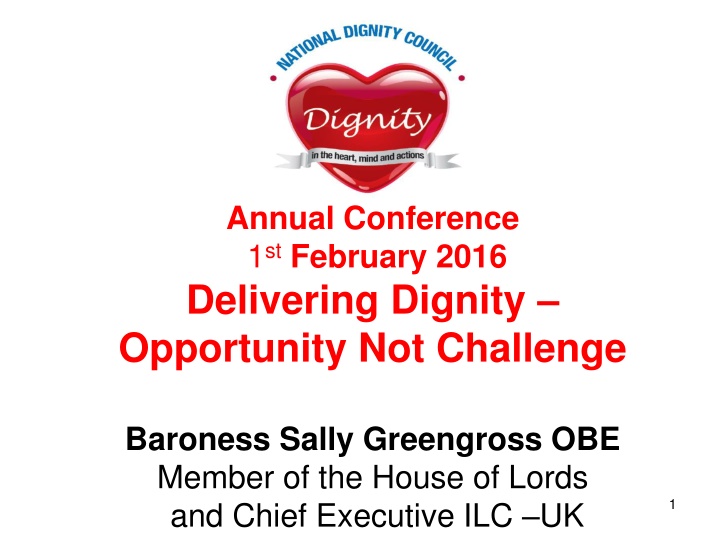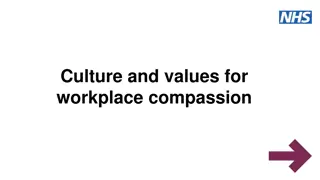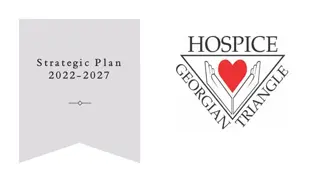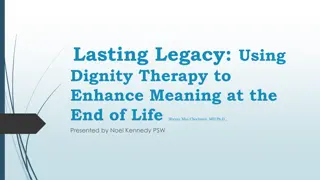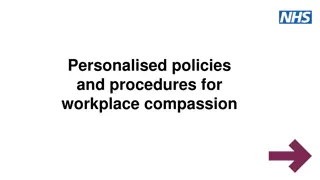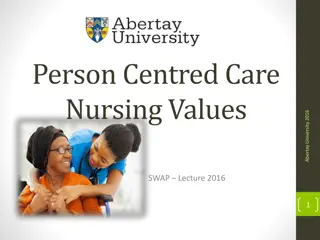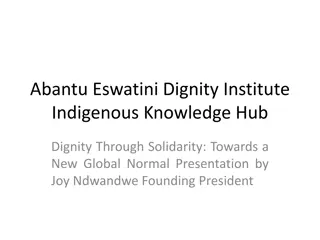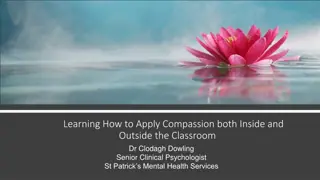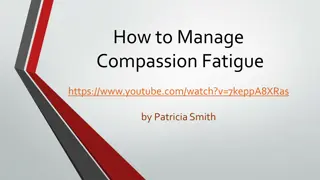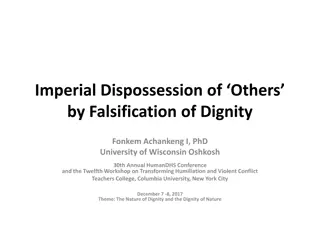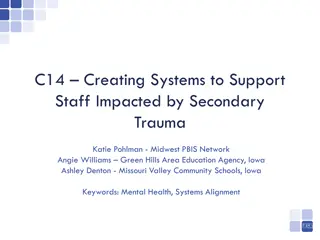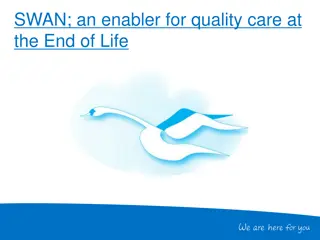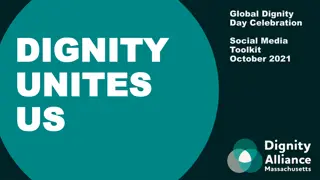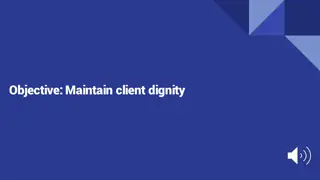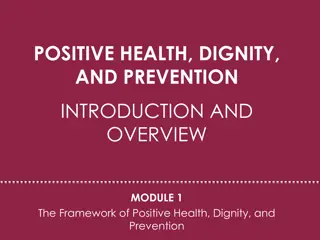Promoting Dignity and Compassion in Care: A Global Perspective
In this content, Baroness Sally Greengross OBE and member of the House of Lords discusses the importance of dignity in care services. Supporting the National Dignity Council and Dignity in Care campaign, the focus is on training and recognition for care providers. The significance of dignity principles is highlighted by various stakeholders and campaigns like Age UK and Dementia Friends. The inter-generational approach to dignity is also emphasized, along with global statistics on aging populations.
Download Presentation

Please find below an Image/Link to download the presentation.
The content on the website is provided AS IS for your information and personal use only. It may not be sold, licensed, or shared on other websites without obtaining consent from the author.If you encounter any issues during the download, it is possible that the publisher has removed the file from their server.
You are allowed to download the files provided on this website for personal or commercial use, subject to the condition that they are used lawfully. All files are the property of their respective owners.
The content on the website is provided AS IS for your information and personal use only. It may not be sold, licensed, or shared on other websites without obtaining consent from the author.
E N D
Presentation Transcript
Annual Conference 1stFebruary 2016 Delivering Dignity Opportunity Not Challenge Baroness Sally Greengross OBE Member of the House of Lords and Chief Executive ILC UK 1
The Dignity Council I fully support the vision of the National Dignity Council where an environment is created where dignity and compassion are the norm. I also fully endorse the aspirations of the Dignity Council as they seek to re-stimulate and refocus the Dignity in Care campaign. Better training and recognition for those who work in care is essential to delivering better care and support. 3 .
The Dignity in Care Network Incidents of people in receipt of health and social care services not being treated with dignity is an unacceptable breach of human rights. Therefore I fully endorse the Dignity in Care campaign's core values about having dignity in our hearts minds and actions. 4
Related Dignity Campaigns Other stakeholders have developed their own campaigns and materials that support dignity principles and dignity in care These Include: Age UK BAPEN The Dignity in Care Commission British Geriatrics Society British Institute of Human Rights Campaign to End Loneliness Older People's Advocacy Alliance Dementia Friends The Malnutrition Task Force The National Care Forum The Relatives & Residents Assn Royal College of Nursing Skills for Care WRVS Beth Johnson Foundation 5
Inter-Generational Approach I share the view of your Dignity Ambassador - Baroness Joan Bakewell who said : We need to be especially careful to instil ways of thinking and behaving that make late years rewarding rather than punishing . This instinct can start young, with all generations realising that the one ahead of them deserves special consideration. After all, they will be there themselves soon 6
Global Ageing There are presently 740 million in the world aged 60 years or over. Within 3 years the number of 65 year olds will outnumber those under the age of 5 for the first time. Across the world, the number of people aged 80 plus has increased from 15 million (1950) to 110 million (2011). In 2014 there were 3.1m people aged 80 in Europe. In 2012, 5 million people in Africa were aged 80 or over. 7 Source. 'Populations Projections by the United Nations by John Wilmoth, 2015 ILC-UK Factpack 2015. 80 at Eighty
The Ageing UK Population : Within 20 years 25% of UK Population will be aged over 65. The number of over 80s have risen by 800,000 in the last decade. The number over 100 has quadrupled over the last 30 years. People now spend 7 years longer in retirement than in the 1970s. Source ONS & ILC-UK 8
Key facts on Social Care Older people's social care has been cut by 2Bn in the last 10 years. The number of people who don t get any help at all, paid or unpaid, has increased from 800,000 in 2010 to over a million in 2015. NHS funding has not kept pace with demographic change and growing needs. A 20 billion shortfall by 2020 is expected. The number of emergency admissions and readmissions in hospitals is increasing. The number of times an older person visits a GP practice has increased from seven to 13 on average in just 13 years. Source Age UK evidence review Nov. 2015 9
The Care Issue 1.86 million people over the age of 50 in England have unmet care needs. The numbers accessing care services have fallen by half a million since 2008/9 (a drop of 30%) despite a growing ageing population. There are already around 1.5 million people providing over 50 hours per week of unpaid care. The UK does not have the required infrastructure to move to a model of care that relies so heavily on family support. Without extra investment greater unpaid caring could risk an erosion in dignity and the quality of care provided. Source The End of Formal Adult Social Care? ILC_UK Dec. 2015 10
The CSR and Dignity Winners & Losers! Damaging cuts to funding for care at home mean that many older people are sacrificing their dignity because they can t get the support they need. A fresh look is needed at the phasing of this investment in social care, with more in years one and two, to reduce the risk of a crisis in social care supply in 2016 and 2017. Local authorities need to be funded sufficiently for them to rebuild preventive services for older people and offer a lot more social care support. 11
The CSR and Dignity Winners & Losers! I welcome the Government s confirmation that the triple lock will continue protecting the value of the State Pension. The doubling of the Disabled Facilities Grant by the end of the CSR period to 500m, can help older people to sustain their dignity for longer - Unless they have health issues! The 2% council tax precept to fund social care and 1.5bn extra for the Better Care Fund will not fill the existing gap in social care. Data from 326 local authorities shows that the councils with the highest concentration of older people and unpaid carers will be the ones that will bring in the least amount of money from the 2% ctp. TheResult may be a post code lottery of health inequality 12
Ageism - Defining the problem In 1968 Robert Butler defined ageism as a combination of three connected elements:- Including prejudicial attitudes towards older people, old age, and the ageing process; Discriminatory practices against older people; And institutional practices and policies that perpetuate stereotypes about older people. 13
England and Wales Life Expectancy by Gender Men are narrowing the gap on women when it comes to life expectancy. By 2030 men will be living 85.7 years on average - just two fewer than women. In 1981 men lagged behind women by six years. Though life expectancy is improving for both sexes, it comes at the cost of widening inequalities between deprived and affluent areas. Sources The Lancet April 2015 and ILC-UK 14
Health Inequality 15 Source - ILC UK and Telegraph Money 2015
Key areas are : Health Wellbeing Empowerment/ Social Contribution Independence & Dignity 17
The Path Forward Wellbeing, Empowerment, Education and Social Engagement 18
Today 1st Feb. is National Dignity Day Human right to dignified treatment Healthy = Dignified Elderly or Older? Culture specific Personal Preference Mrs Smith, Doris, Duck, My love! 19
DIGNITY DOS 1. Have a zero tolerance of all forms of abuse. 2. Support people with the same respect you would expect. 3. Treat each person as an individual. 4. Enable people to maintain independence, choice and control. 5. Listen and support people to express their needs and wants. 6. Respect people s right to privacy. 7. Ensure people feel able to complain without fear of retribution. 8. Engage with family members and carers as care partners. 9. Assist people to maintain confidence and self-esteem. 10. Act to alleviate people s loneliness and isolation 20
Where next? I really hope this conference will give us the opportunity to both underpin the Campaigns actions to raise awareness, inspire, share good practice, transform services and reward and recognise those people who make a difference and serve to ensure and build connectivity, so that the Dignity Champions feel empowered, resourced and are able to be utilised as a real force for change. 21 Thank You
